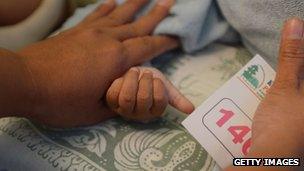MPs urge more action on female genital mutilation
- Published

The practice has been illegal in the UK since 1985
Female genital mutilation is not being properly tackled in the UK as police and social workers are afraid of being seen as politically incorrect, MPs say.
Ministers are spending £35m abroad on ending the practice - illegal in the UK but a cultural tradition in some parts of Africa, the Middle East and Asia.
The International Development Committee said the efforts overseas were being "undermined" by inaction at home.
The Home Office said new initiatives aim to eradicate the "abuse" in the UK.
FGM, also known as female circumcision, has been illegal in the UK since 1985. Laws were later extended to cover British citizens and permanent residents involved in the practice overseas.
But the committee's report said the government's message was "weakened" by the fact that an estimated 20,000 girls were at risk of FGM in the UK and it was "unforgivable" that there have been no prosecutions to date.
It is said to be inflicted on girls aged between four and 13, and women who have been cut can also experience problems during child birth and menstruation.
The UK has made ending sexual violence a key aim of the its presidency of the G8 and the Department for International Development (DfID) is funding anti-violence programmes for women and girls in more than 20 countries.
'Brutal practice'
International Development Secretary Justine Greening said: "We will continue to demonstrate leadership at the international level to end these terrible crimes."
But the MPs' report said of FGM: "The UK's credibility in calling to end the practice overseas is undermined by the failure to tackle the problem at home."
"Robust action should be taken to counter political correctness and address culturally sensitive practices such as female genital mutilation within the UK."
The MPs said the UK should adopt a cross-agency approach, where the "police proactively track girls at risk of female genital mutilation and step in to prevent parents having the procedure performed on their daughters."
The committee also said it was "appalled" there had been 148 referrals of female genital mutilation cases in the past four years but no girls had been placed on the child protection register by police or social services.
It added that while DfID could "take pride in its recently increased efforts" it still had "a long way to go".
Committee chairman Sir Malcolm Bruce said: "For DfID to meet its goal to eradicate this brutal practice within a generation, the UK government must also act on this issue in the UK."
'Renewed focus'
A Home Office spokesman said: "There is no justification for female genital mutilation. It is child abuse and it is illegal.
"We are absolutely clear that political or cultural sensitivities must not get in the way of preventing and uncovering this terrible form of criminal activity. The law in this country applies to absolutely everyone."
He said an action plan for tackling violence against women and girls in England and Wales "has a renewed focus" and the Home Office was working with the Director of Public Prosecutions to help secure convictions and with charities and organisations to improve awareness.
The Scottish and Northern Ireland governments run separate initiatives aimed at stamping out the practice.
- Published21 May 2013
- Published24 April 2013
- Published7 February 2013
- Published2 February 2013
- Published20 September 2012
- Published23 July 2012